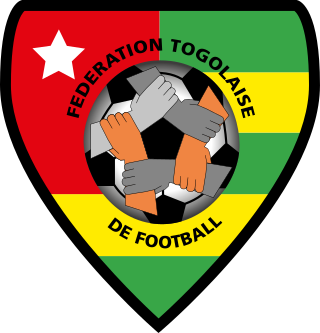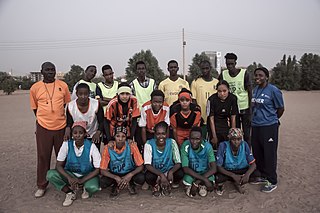
The Togo national football team represents Togo in international football and is controlled by the Togolese Football Federation. The national football team of Togo made their debut in the FIFA World Cup in 2006. Their team bus underwent a fatal attack in Angola prior to the 2010 Africa Cup of Nations. They withdrew and were subsequently banned from the following two tournaments by the Confederation of African Football (CAF). In 2013 for the first time in history, Togo reached the quarter-finals of the Africa Cup of Nations. The team represents both FIFA and the Confederation of African Football (CAF).
The Tanzania national football team represents Tanzania in men's international football and is controlled by the Tanzania Football Federation, the governing body for football in Tanzania, Tanzania's home ground is Benjamin Mkapa National Stadium in Dar es Salaam and their head coach is Adel Amrouche from Algeria. They are colloquially known as the Taifa Stars. Tanzania has never qualified for the FIFA World Cup. Before uniting with Zanzibar, the team played as the Tanganyika national football team, The team represents both FIFA and Confederation of African Football (CAF).

The Chad national football team, nicknamed Les Sao, represents Chad in international football and is controlled by the Chadian Football Federation, the governing body for football in the country. The team has never qualified for the World Cup finals or Africa Cup of Nations. Home matches are played at the Idriss Mahamat Ouya Stadium. In April 2021, FIFA banned the Chad national football team from participating in global football over the Chadian government's interference with the Chadian Football Federation.

The Eritrea national football team represents Eritrea in men's international football and it is controlled by the Eritrean National Football Federation (ENFF). It is nicknamed the Red Sea Boys. It has never qualified for the finals of the FIFA World Cup or the Africa Cup of Nations. Asmara side Red Sea FC are the main supplier for the national team and the team represents both FIFA and Confederation of African Football (CAF). Out of 211 national teams in the FIFA men's team world rankings, they are the only one that is unranked.

The Sudan Football Association (S.F.A.) is the governing body of football in Sudan. It was established in 1936 and affiliated with FIFA in 1948. Along with the national associations of Egypt, Ethiopia and South Africa, the Sudan Football Association was one of the founding members of the Confederation of African Football (CAF) in 1957. The International Federation of Football Associations, FIFA, decided to suspend the activities of the Sudan Football Association (SFA) starting from Friday 30 June 2017. The suspension was lifted on Thursday 13 July 2017.
The Egypt women's national football team, nicknamed "the Cleopatras", represents Egypt in international women's football. It is managed by the Egyptian Football Association, the governing body of football in the country.
Abderrahmane Mahjoub or Abderrahmane Belmahjoub was a French and Moroccan international football midfielder.

Hubert Velud is a French association football manager and former player who last managed the Burkina Faso national team.
The Lebanon women's national football team is the official women's national football team of the country of Lebanon. The team was established in 2005, and is controlled by the Lebanon Football Association (LFA), the governing body for football in Lebanon. Whilst the team has yet to qualify for the FIFA Women's World Cup or the AFC Women's Asian Cup, they have finished runners-up at the 2022 edition of the WAFF Women's Championship, and in third place at the 2007 and 2019 editions.
The South Sudan national football team represents South Sudan in international football and is controlled by the South Sudan Football Association, the governing body for football in South Sudan.
The South Sudan women's national team represents South Sudan in international women's football competitions.
Football is the most popular sport for women in Somalia. However, Somalia does not have a women's national football team with FIFA recognition, and have never played in a single international fixture. They are in a region that faces many challenges for the development of women's sport. Football is the most popular women's sport in the country and teams do exist for women to play on though they are few. Participation rates dropped by a large number in 2006. The sport's governing body in the country is not providing much support for the game and faces its own challenges.

The Sudan women's national football team is the official women's national football team of the country of Sudan. The team was established in 2021, and is controlled by the Sudan Football Association (SFA), the governing body for football in Sudan.

The 2021 FIFA Arab Cup was the 10th edition of the Arab Cup, the Arab world's national team football tournament; it was the first edition under FIFA's jurisdiction, with previous editions having been organized by the Union of Arab Football Associations (UAFA). It took place between 30 November and 18 December in Qatar as a prelude and test event to the 2022 FIFA World Cup, which was also held in Qatar.
Ali Abdallah Abu-Eshrein Darasha is a Sudanese footballer who plays as a goalkeeper for Al-Hilal SC and the Sudan national football team.
Ahmed Ibrahim Ahmed Al-Nour is a Sudanese professional footballer who plays as a defender for Al-Hilal Omdurman and the Sudan national football team.
Al-Jezoli Hussien Nouh Mohamed is a Sudanese professional footballer who plays as a winger for Al-Merrikh and the Sudan national football team.
Ahmed Saeed Ahmed Awad Alla is a Sudanese professional footballer who plays as a forward for Al-Ahly Merowe and the Sudan national football team.

Ahmed Adam Ahmed Muhamed, commonly known as Ahmed Bibo is a Sudanese professional footballer who plays as a defender for Al-Merrikh SC and the Sudan national football team.

Women in Sudan were not allowed to officially participate in sports such as football, until the revolution of 2018–19 abolished the former restrictive public order laws. In September 2019, a women's league with 21 teams from different cities in Sudan was established, with Wala'a Essam al-Boushi, the Sudanese Minister of Youth and Sport, saying the transitional government will "make women's sports one of the pillars of the country's development."









